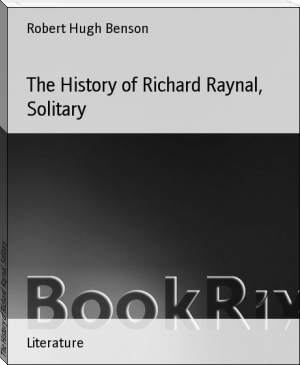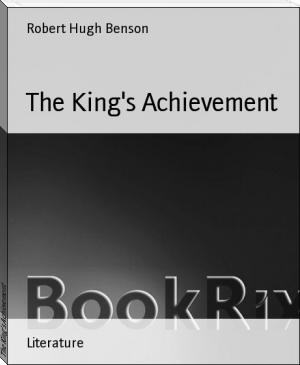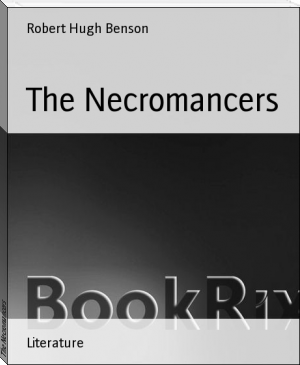The Necromancers by Robert Hugh Benson (motivational books for women .TXT) 📖

- Author: Robert Hugh Benson
- Performer: -
Book online «The Necromancers by Robert Hugh Benson (motivational books for women .TXT) 📖». Author Robert Hugh Benson
When therefore he received a nervous little note from Lady Laura, reminding him of the séance to be held in Baker Street, and begging his attendance, he wrote a most proper letter back again, thanking her for her kindness, but saying that he had come to the conclusion that this kind of thing was not good for him or his work, and begging her to make his excuses to Mr. Vincent.
A week or two passed, and nothing whatever happened. Then he heard again from Lady Laura, and again he answered by a polite refusal, adding a little more as to his own state of mind; and again silence fell.
Then at last Mr. Vincent called on him in person one evening after dinner.
Laurie's rooms were in Mitre Court, very convenient to the Temple—two rooms opening into one another, and communicating with the staircase.
He had played a little on his grand piano, that occupied a third of his sitting-room, and had then dropped off to sleep before his fire. He awakened suddenly to see the big man standing almost over him, and sat up confusedly.
"I beg your pardon, Mr. Baxter; the porter's boy told me to come straight up. I found your outer door open."
Laurie hastened to welcome him, to set him down in a deep chair, to offer whisky and to supply tobacco. There was something about this man that commanded deference.
"You know why I have come, I expect," said the medium, smiling.
Laurie smiled back, a little nervously.
"I have come to see whether you will not reconsider your decision."
The boy shook his head.
"I think not," he said.
"You found no ill effects, I hope, from what happened at Lady Laura's?"
"Not at all, after the first shock."
"Doesn't that reassure you at all, Mr. Baxter?"
Laurie hesitated.
"It's like this," he said; "I'm not really convinced. I don't see anything final in what happened."
"Will you explain, please?"
Laurie set the results of his meditations forth at length. There was nothing, he said, that could not be accounted for by a very abnormal state of subjectivity. The fact that this ... this young person's name was in his mind ... and so forth....
"... And I find it rather distracting to my work," he ended. "Please don't think me rude or ungrateful, Mr. Vincent."
He thought he was being very strong and sensible.
The medium was silent for a moment.
"Doesn't it strike you as odd that I myself was able to get no results that night?" he said presently.
"How? I don't understand."
"Why, as a rule, I find no difficulty at all in getting some sort of response by automatic handwriting. Are you aware that I could do nothing at all that night?"
Laurie considered it.
"Well," he said at last, "this may sound very foolish to you; but granting that I have got unusual gifts that way—they are your own words, Mr. Vincent—if that is so, I don't see why my own concentration of thought, or hypnotic sleep or trance or whatever it was—might not have been so intense as to—"
"I quite see," interrupted the other. "That is, of course, conceivable from your point of view. It had occurred to me that you might think that.... Then I take it that your theory is that the subconscious self is sufficient to account for it all—that in this hypnotic sleep, if you care to call it so, you simply uttered what was in your heart, and identified yourself with ... with your memory of that young girl."
"I suppose so," said Laurie shortly.
"And the rapping, loud, continuous, unmistakable?"
"That doesn't seem to me important. I did not actually hear it, you know."
"Then what you need is some unmistakable sign?"
"Yes ... but I see perfectly that this is impossible. Whatever I said in my sleep, either I can't identify it as true, in which case it is worthless as evidence, or I can identify it, because I already know it, and in that case it is worthless again."
The medium smiled, half closing his eyes.
"You must think us very childish, Mr. Baxter," he said.
He sat up a little in his chair; then, putting his hand into his breast pocket, drew out a note-book, holding it still closed on his knee.
"May I ask you a rather painful question?" he said gently.
Laurie nodded. He felt so secure.
"Would you kindly tell me—first, whether you have seen the grave of this young girl since you left the country; secondly, whether anyone happens to have mentioned it to you?"
Laurie swallowed in his throat.
"Certainly no one has mentioned it to me. And I have not seen it since I left the country."
"How long ago was that?"
"That was ... about September the twenty-seventh."
"Thank you...!" He opened the note-book and turned the pages a moment or two. "And will you listen to this, Mr. Baxter?—'Tell Laurie that the ground has sunk a little above my grave; and that cracks are showing at the sides.'"
"What is that book?" said the boy hoarsely.
The medium closed it and returned it to his pocket.
"That book, Mr. Baxter, contains a few extracts from some of the things you said during your trance. The sentence I have read is one of them, an answer given to a demand made by me that the control should give some unmistakable proof of her identity. She ... you hesitated some time before giving that answer."
"Who took the notes?"
"Mrs. Stapleton. You can see the originals if you wish. I thought it might distress you to know that such notes had been taken; but I have had to risk that. We must not lose you, Mr. Baxter."
Laurie sat, dumb and bewildered.
"Now all you have to do," continued the medium serenely, "is to find out whether what has been said is correct or not. If it is not correct, there will be an end of the matter, if you choose. But if it is correct—"
"Stop; let me think!" cried Laurie.
He was back again in the confusion from which he thought he had escaped. Here was a definite test, offered at least in good faith—just such a test as had been lacking before; and he had no doubt whatever that it would be borne out by facts. And if it were—was there any conceivable hypothesis that would explain it except the one offered so confidently by this grave, dignified man who sat and looked at him with something of interested compassion in his heavy eyes? Coincidence? It was absurd. Certainly graves did sink, sometimes—but ... Thought-transference from someone who noticed the grave...? But why that particular thought, so vivid, concise, and pointed...?
If it were true...?
He looked hopelessly at the man, who sat smoking quietly and waiting.
And then again another thought, previously ignored, pierced him like a sword. If it were true; if Amy herself, poor pretty Amy, had indeed been there, were indeed near him now, hammering and crying out like a child shut out at night, against his own skeptical heart ... if it were indeed true that during those two hours she had had her heart's desire, and had been one with his very soul, in a manner to which no earthly union could aspire ... how had he treated her? Even at this thought a shudder of repulsion ran through him.... It was unnatural, detestable ... yet how sweet...! What did the Church say of such things...? But what if religion were wrong, and this indeed were the satiety of the higher nature of which marriage was but the material expression...?
The thoughts flew swifter than clouds as he sat there, bewildering, torturing, beckoning. He made a violent effort. He must be sane, and face things.
"Mr. Vincent," he cried.
The kindly face turned to him again.
"Mr. Vincent...."
"Hush, I quite understand," said the fatherly voice. "It is a shock, I know; but Truth is a little shocking sometimes. Wait. I perfectly understand that you must have time. You must think it all over, and verify this. You must not commit yourself. But I think you had better have my address. The ladies are a little too emotional, are they not? I expect you would sooner come to see me without them."
He laid his card on the little tea-table and stood up.
"Good-night, Mr. Baxter."
Laurie took his hand, and looked for a moment into the kind eyes. Then the man was gone.
IIThat was a little while ago, now, and Laurie sitting over breakfast had had time to think it out, and by an act of sustained will to suspend his judgment.
He had come back again to the state I have described—to nervous interest—no more than that. The terror seemed gone, and certainly the skepticism seemed gone too. Now he had to face Maggie and his mother, and to see the grave....
Somehow he had become more accustomed to the idea that there might be real and solid truth under it all, and familiarity had bred ease. Yet there was nervousness there too at the thought of going home. There were moods in which, sitting or walking alone, he passionately desired it all to be true; other moods in which he was acquiescent; but in both there was a faint discomfort in the thought of meeting Maggie, and a certain instinct of propitiation towards her. Maggie had begun to stand for him as a kind of embodiment of a view of life which was sane, wholesome, and curiously attractive; there was a largeness about her, a strength, a sense of fresh air that was delightful. It was that kind of thing, he thought, that had attracted him to her during this past summer. The image of Amy, on the other hand, more than ever now since those recent associations, stood for something quite contrary—certainly for attractiveness, but of a feverish and vivid kind, extraordinarily unlike the other. To express it in terms of time, he thought of Maggie in the morning, and of Amy in the evening, particularly after dinner. Maggie was cool and sunny; Amy suited better the evening fever and artificial light.
And now Maggie had to be faced.
First he reflected that he had not breathed a hint, either to her or his mother, as to what had passed. They both would believe that he had dropped all this. There would then be no arguing, that at least was a comfort. But there was a curious sense of isolation and division between him and the girl.
Yet, after all, he asked himself indignantly, what affair was it of hers? She was not his confessor; she was just a convent-bred girl who couldn't understand. He would be aloof and polite. That was the attitude. And he would manage his own affairs.
He drew a few brisk draughts of smoke from his pipe and stood up. That was settled.
It was in this determined mood then that he stepped out on to the platform at the close of this wintry day, and saw Maggie, radiant in furs, waiting for him, with her back to the orange sunset.
These two did not kiss one another. It was thought better not. But he took her hand with a pleasant sense of welcome and home-coming.
"Auntie's in the brougham," she said. "There's lots of room for the luggage on the top.... Oh! Laurie, how jolly this is!"
It was a pleasant two-mile drive that they had. Laurie sat with his back to the horses. His mother patted his knee once or twice under the fur rug, and looked at him with benevolent pleasure. It seemed at first a very delightful home-coming. Mrs. Baxter asked after Mr. Morton, Laurie's coach, with proper deference.
But places have as strong a power of retaining associations as persons, and even as they turned down into the hamlet Laurie was aware that this was particularly true just now. He carefully did not glance out
 Reading books romantic stories you will plunge into the world of feelings and love. Most of the time the story ends happily. Very interesting and informative to read books historical romance novels to feel the atmosphere of that time.
Reading books romantic stories you will plunge into the world of feelings and love. Most of the time the story ends happily. Very interesting and informative to read books historical romance novels to feel the atmosphere of that time.




Comments (0)